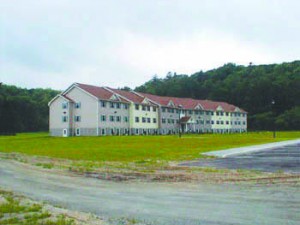Early in the spring of 2012, Houghton College made the decision to close the flats for student housing. This was disappointing news to much of the student body for multiple reasons.
“The main reason for the uproar was because of the misconceptions surrounding the decision to close the flats” said Jim Vitale, junior.

The bulk of students’ arguments seem to revolve around financial issues and a lack of understanding thereof, especially given that the flats appear to have remained open and functional.
The decision to close the flats was sparked by a need to decrease spending across campus. Each department was asked to account for their spending and to make some cuts. In a campus-wide email sent out this last week, Dr. Robert Pool, who recently became VP for Student Life, said that, “We have also had to make some sacrifices.” He continued to say that “Necessary cuts were made with a wise eye toward optimizing learning and trimming excess.”
The decision to cut the flats boils down to occupancy management practices.
“We made the decision based on the information we had at the time” said Gabe Jacobsen, director of Residence Life.
During last spring—when the cuts were decided—there were roughly 90 rooms that were left empty in the resident halls.
“When we were making the decision to close the flats, we realized we could have done it the year before and still been able to house everybody; it just wasn’t on the radar” stated Jacobsen, “even if the incoming freshmen class surpassed 400,” a number larger than any of the current classes, “we would still be okay”
There are currently some possibilities being considered for ways in which the institution could change the structure of the flats to accommodate for future use. One suggestion proposed would be to change the requirements for living in the flats. Currently students must be in their second year at Houghton with a minimum of 60 credits and not be on disciplinary probation.
Nevertheless these changes exist only as possibilities for the future. According to Jacobsen, “at least as of this year the capacity of housing will outmatch the current projection for the incoming class.” However, the school will remain flexible. If the need for extra housing arises, the prospect of reopening the flats is not completely out of the question.
Currently the former student residence has been re-purposed for short-term housing for various groups and organizations that Houghton hosts such as youth groups and sports camps. Having the flats available for this purpose makes accommodating guests during these events more feasible for the Residence Life department. Previously the unused parts of the Gillette basement were utilized for this purpose.
Furthermore, being in such a remote location severely limits housing options for new faculty members, and so the flats have recently been utilized for long-term housing for transitioning faculty members.
“Having the flats available has made the transition to Houghton easier for several new faculty and administrators since I was essentially able to tell them ‘we have a place that you can rent for a while,’” said Dale Write, Executive Director of Human Resources and Administration.
Not only has closing the flats benefitted the institution by enabling Houghton to house faculty long term and providing room for groups and organizations to stay while on campus, but also, according to Mr. Wright, “The combination of additional revenue and expense reductions have surpassed our expectations.”
